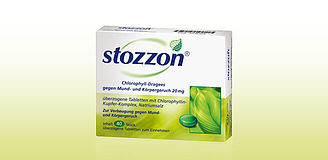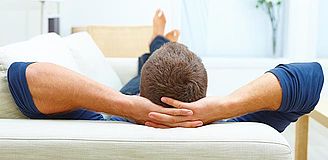
How body odour comes about and how to combat it
The human nose has to work hard: Anywhere where there are people it smells – sometimes it smells really nice, and sometimes it smells unpleasant. Each person has their own individual scent due to a genetically pre-designed, individual plan. The olfactory sense often decides between sympathy (“You smell nice”) or antipathy (“You stink!”). When there is an acrid inherent smell coming from normal “perspiration”, it should be dealt with. Hygiene, other clothes and a change in diet can work wonders for unpleasant body odour. And – a herb has been grown to combat body odour: In particularly tough cases chlorophyll can help.
What do the heat of summer, heavily seasoned food, excess weight, high alcohol consumption and sport all have in common? All of them make us sweat a lot. First of all, the good news: sweating is not fundamentally bad, the cooling effect of sweat evaporating ensures that the body is kept at the right temperature to function. Initially, sweat itself is odour-free and does not necessarily lead to body odour.
Body odour is caused by bacteria
The bad news: sweat is not just made up of 99 % water and 0.5 % salt, it also contains the basic foodstuffs for bacteria, e.g. urea, protein, lactic acid, sugar and fat. And if these bacteria get comfortable on your skin, we can really smell it. It’s the bacteria, not the sweat, which are responsible for unpleasant body odour.

Most of the human sweat glands are located under the skin on the forehead, palms of the hands and soles of the feet. If feet are also enclosed without any air, this is a real feast for bacteria and a source of body odour. A second self-service restaurant for the bacteria is the armpit. The bacteria feel particularly at home in this moist environment where you can also find humans “sweat glands”. The longer the bacteria sit on the skin and decompose the sweat, the more intense and unpleasant the body odour.
You smell like what you eat
You know that: After a great meal with lots of garlic, it can become very lonely. The smell of garlic, like leeks and onions, is sweated out all over the body. You smell like what you have eaten.
Caffeine, black tea, alcohol, heavily seasoned or hard-to-digest food in turn increase sweat production. If it is caused by poor hygiene, then the body odour is embarrassing.
That helps with unpleasant body odour
If you wash regularly then you’re already on the right path. It doesn’t matter if it’s just with water, or with soap or shower gel / bubble bath, the most important thing is the frequency. If you wash yourself too frequently, you can damage the acid mantle of the skin. The right frequency is decisive for pleasant body odour.
In addition, it helps a lot to shave your armpits in order to “ventilate” this area. Of course you also sweat in areas where you don’t have hair, but bare armpits are far less attractive to bacteria.
Clothes should also be washed regularly, according to the following principle: The closer an item of clothing is to the body, the more often it should be washed. Used clothes do not belong back in the wardrobe, where bacteria can set up a nice little home and develop their smell, but in the washing machine.
Light, airy clothing and breathable, non-restrictive shoes can help to combat unpleasant body odour. Avoiding a fatty, heavily seasoned and spicy diet, which can lead to sweating, and practising sport, which stops you from sweating so easily in day-to-day life, not only helps you to get in shape but also fights against unpleasant odours.
Deodorant or no deodorant – That’s the question
The amount of money spent on toiletries is immense. According to one study, Germans spend 700 million euros per year on deodorant – or deo for short – alone. Is this justified?
Deodorants and cosmetics often only cover up the unpleasant odours of armpit sweat, they do not eliminate the cause. Therefore, there are also deodorants which act as antiperspirants and inhibit sweat formation. The most natural deodorants regulate the acidity level of the skin. In addition, you can take a look at our tips on how to combat body odour and in particularly tough cases Stozzon Chlorophyll Dragees can help. They are the only authorised medicine against bad breath and body odour – you can find Stozzon in any pharmacy.
Tips:
- Hygiene: Daily washing – particularly the underarms – helps to combat body odour and the smell of sweat. If there is a particularly persistent odour, clean your armpits again with the damp washcloth.
- Deodorant: Use sparingly, as deo itself is also a source of food for the bacteria.
- Clothing:Wear fresh underwear and socks each day, store clothes in a ventilated place.
- Diet: Avoid fatty, heavily seasoned and spicy food – A healthy diet can help to fight against body odour.
- Health: Avoid alcohol, stop smoking, do sport, and your body odour will already be a great deal better.
- Chlorophyll Dragees: Stozzon, the medicine against bad breath and body odour from your pharmacy.








